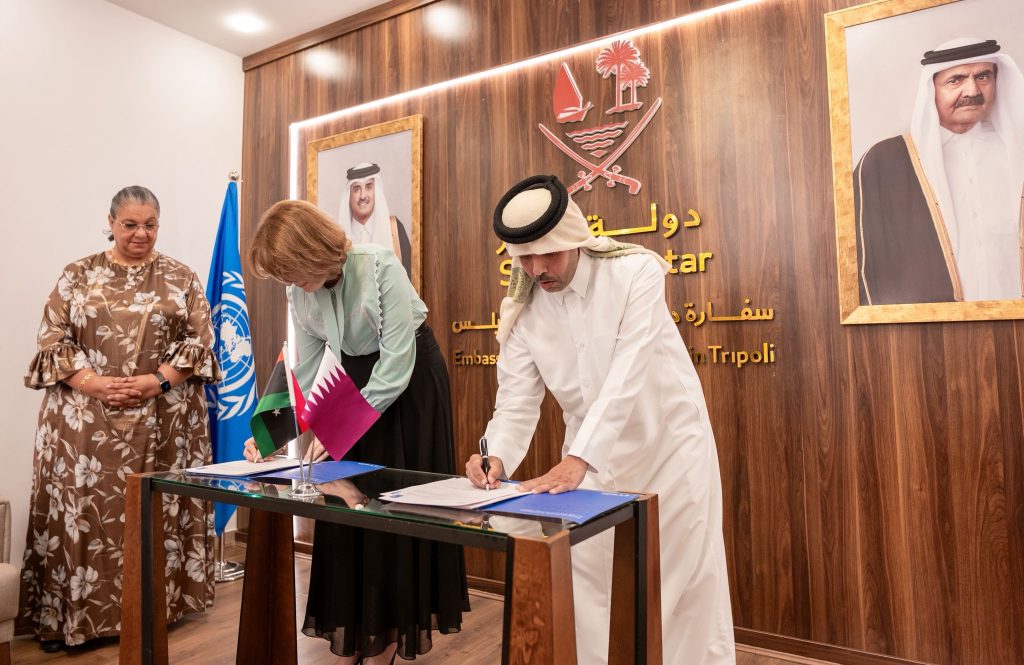Tripoli— The United Nations Support Mission in Libya (UNSMIL) has condemned what it called “attempts” to manipulate public opinion in Libya by means of “spreading false narratives,” saying it “wishes to clarify for the public the financing of the UN generally and UNSMIL’s operations, including the implementation of the roadmap.”
In the statement released on 18 November titled “UNSMIL Clarifies Disinformation Regarding Political Process Funding,” UNSMIL said it “condemns all attempts to manipulate public opinion by spreading false narratives.” It called on “all Libyan stakeholders to come together to give the power back to the Libyan people.”
The clarification came to justify a controversial funding agreement signed in Tripoli on 17 November by Khaled Al Dosari, Ambassador of the State of Qatar, and Sophie Kemkhadze, UNDP Resident Representative in Libya, claiming that it would support a so-called joint project termed “Assistance to the Political Dialogue and Civic Engagement.”
Ms. Hanna Tetteh, the Special Representative of the UN Secretary-General (SRSG) in Libya and head of UNSMIL, welcomed the signing of the agreement and said in a post on X that the funding would “contribute to advancing UN efforts to implement the UNSMIL-facilitated Roadmap presented to the Security Council on 21 August 2025.
However, UNSMIL did not specifically reveal in a clear way with evidence just how the narratives were false or whom exactly it believed would attempt doing the manipulation of the Libyans’ opinion.
In June 2025, protests against UNSMIL in Tripoli prompted the mission to remind both the Libyan public and political figures of the UN’s privileges in their country that should not be ignored. It said in a statement released on 27 June that it was “dismayed by statements purportedly from some Libyan political figures that appear to encourage not just demonstrations but going further to actively encourage unlawful actions against UN personnel and property.”
In this case, UNSMIL’s action was immediately condemned by the Defense and National Security Committee (DNSC) of the Libyan House of Representatives and by Prime Minister Osama Hammad, head of the Parliament-appointed government in east Libya.
Hammad announced the suspension of all forms of dealings and coordination with UNSMIL due to its “blatant and unacceptable overreach of the mission’s mandate,” stressing that the action was “a deliberate and detrimental circumvention of nationally-led Libyan initiatives.”
According to UNSMIL’s clarification, “the UN is funded both through its regular budget made up of assessed contributions from all 193 Member states, in accordance with the decisions of the General Assembly, of which Libya is a member, and voluntary contributions towards particular projects and programs from individual member states.”
“Donors through their voluntary contributions can provide funding for specificprograms or as contributions towards pooled funding arrangements. The operational implementation of such programs is under the determination and management of the UN,” the clarification added.
“Over the course of its existence, UNSMIL has received voluntary contributions from Member States to support several high-impact initiatives aimed at benefiting the Libyan population, including—but not limited to—the political process, de-mining and managing war remnants, reforming and unifying national institutions, and supporting the holding of elections.
“To date, at least 13 countries and regional organizations have provided UNSMIL voluntary funding for the political process and civic engagement.
“No donor country has any role in determining the direction of the political process, including the agenda, participants or outcomes as a result of their making a donation to UNSMIL’s programs,” it said.
Nonetheless, Seen from different angles, this agreement has further eroded what remained of transparency, credibility and trust of UNSMIL among the Libyan people, especially in light of the ongoing stagnant political process and lack of resolve on the part of the five permanent members of the UN Security Council.
Despite these clarifications, there seems to be the damage had been done insofar as confidence in UNSMIL is concerned.
UNSMIL can solve the stalemate by heading the demands put forward by Prime Minister Hammad which include: “An immediate annulment of any financial or political arrangements concluded in the agreement without the knowledge and consent of the Libyan state”; and that “no political initiative, roadmap, or dialogue process shall be recognized or granted legitimacy unless it originates authentically from within Libya and remains entirely free from external financing or improper influence.”
